 Petzlover
PetzloverGull Terr is originated from Pakistan but Walker Hound is originated from United States. Both Gull Terr and Walker Hound are having almost same height. Gull Terr may weigh 13 kg / 29 pounds more than Walker Hound. Both Gull Terr and Walker Hound has almost same life span. Both Gull Terr and Walker Hound has same litter size. Both Gull Terr and Walker Hound requires Low Maintenance.
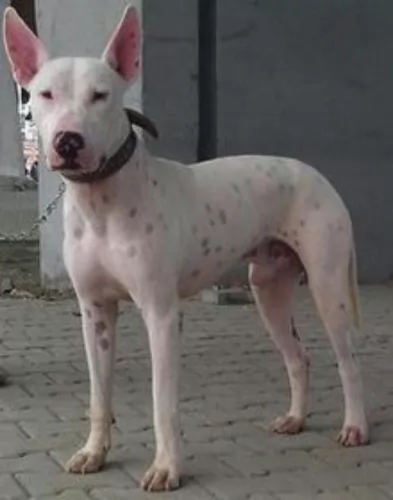 The Gull Terr hails from Pakistan. Having been introduced to the country by the British Raj, the dog has always been valued for its guarding and fighting abilities.
The Gull Terr hails from Pakistan. Having been introduced to the country by the British Raj, the dog has always been valued for its guarding and fighting abilities.
The British army, on bringing English Bull Terriers with them, mated them with local dogs. The dog was in other words, created from the old bull terrier which became extinct, and the Bully Kutta.
The Gull Terr or Pakistani Bull Terrier as he is known is a rare breed of dog. Today they are usually found in rural areas of Pakistan as well as in the Indian Panjab area, becoming popular as both pet and watchdog. It is no longer used for dog fighting as this has been banned.
The Walker Hound is actually two different breeds today both descendant from the original Walker. They are the Running Walker Hound and the Treeing Walker Coonhound and mark their ancestors as the American Foxhound and the English Foxhound. The Treeing Walker is a breed developed in the United States when a “Tennessee Lead Dog” was crossed with a Walker Hound. The Running Walker is considered a Foxhound not a coonhound. They Running Walker does not have a treeing instinct and is not as common in hunting in the southern US as the Treeing Walker Coonhound.
In 1945 the United Kennel Club (UKC) recognized the Treeing Walker Coonhound and by the AKC (American Kennel Club) in 2012. They were developed to hunt and “tree” racoons – so the coonhound label. They also are capable of hunting bears, deer, bobcats and mountain lions. Their baying voice is distinctive that even at a great distance a hunter can recognize the voice of his dog.
Both types of Walkers are calm, gentle and friendly family dogs. The original Walker Hounds were bred in Kentucky by John Walker and George Maupin. The Walker Coonhound, Treeing was recognized as part of the English Coonhound breed by the UKC in 1905. In 1945, they were then recognized as their own breed by the UKC.
They have become the most popular hound competitor in coon hunt competitions. They are known for speed and an ability to catch more racoons in a shorter period of time than any other coonhound. They also tree squirrels, cougars. Opossums, roof rats and skunks.
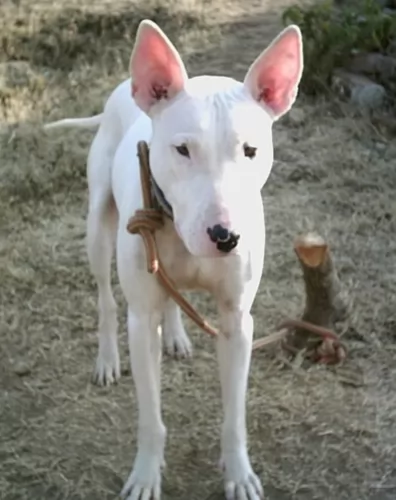 As a medium sized dog, the muscled Gull Terr stands as 45 – 66cm in height and weighs in the area of 40 – 45kg.
As a medium sized dog, the muscled Gull Terr stands as 45 – 66cm in height and weighs in the area of 40 – 45kg.
The dog has a short, smooth coat which is white, but you may find some black spots on him. He has a egg shaped head, ears are naturally erect, dark slanted eyes, and he has a long tail which is held upwards. Muscled and agile, he is a powerful working breed and makes a good watchdog.
This is an aggressive dog breed, and first-time dog owners might want to have a more amicable kind of pet to start off with.
He is a fearless dog, somewhat aggressive and suspicious towards strangers and therefore wants to protect his owner from them. With training and socialization he can be good with children in the home, although he is inclined to be boisterous and stubborn. He has fierce protective instincts, even though he is considered not as aggressive as some other Pakistani dog breeds.
The Gull Terr will need an experienced dog handler. Even though he has been a fighter in his day, he is capable of being an excellent family pet as well. You won't have trouble training him as he is intelligent. He then becomes more obedient and more manageable. He is a very active dog and therefore he won't fit into city dwelling where there are small spaces. He needs a place to run and on top of that he will require a good deal of exercise.
This working dog is tall and lean with the males being somewhat larger than the females. They have broad skulls and hanging, long ears with a long muzzle. They have a soft expression in their dark eyes, straight legs and compact cat-like feet. The coat is smooth, glossy and fine. The traditional color is a tricolor or a bi-color in white with black and tan markings. The bicolors are white and tan or white and black. Their speed comes from the long , powerful and muscled legs and hindquarters along with the frame that is lean and streamlined.
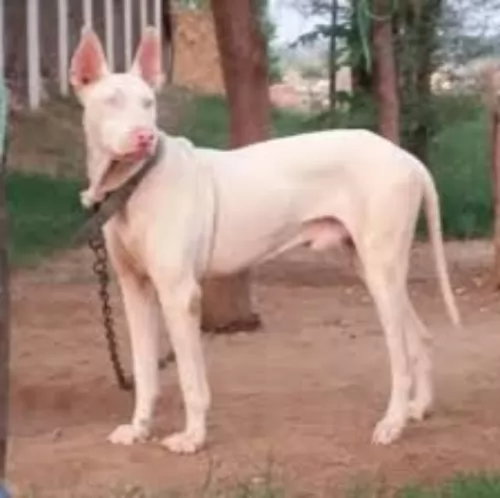 Your Gull Terr love the attention he receives from his human family and he won’t flourish at all if he is put into the back yard for watch dog purposes only. He is a dog that needs to come indoors to be with his family.
Your Gull Terr love the attention he receives from his human family and he won’t flourish at all if he is put into the back yard for watch dog purposes only. He is a dog that needs to come indoors to be with his family.
He tends to be somewhat aggressive and this is why he isn’t looked upon as the ideal pet for first-time dog owners and those with young children in the home.
He is a confrontational dog, willing to enter into a fight with provocation. Strong willed he will require early training and socialization, and when he is brought up by a firm, consistent, kind owner, he can get over his aggression and become a loyal, devoted, protective and loving pet.
2.Special talents Walkers are capable of covering a lot of ground in a hurry. Speed and treeing instinct.
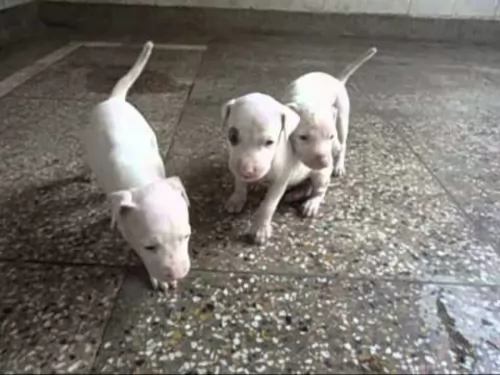 The Gull Terr has a deep chest and this means he is more prone to bloat, a condition known as gastric dilation volvulus.
The Gull Terr has a deep chest and this means he is more prone to bloat, a condition known as gastric dilation volvulus.
Your pet's stomach fills with air and this leads to decreased blood flow to vital organs. The stomach can twist and this is when the condition becomes life threatening as blood supply to the stomach is cut off. Instead of feeding him large meals, feed him smaller meals more frequently.
Deafness in your pet can be temporary or permanent, in one ear or both. There are are so many reasons why your pet could be deaf and it could be a birth defect, an infection or old age. Certain dogs such as the white coated Gull Terr are also more predisposed to congenital deafness.
Get him to the vet who will examine your dog’s ear canal for wax and debris and discuss the way to go for your beloved pet.
The Treeing Walker Coonhound is a fairly healthy breed needing to watch out for accidents on the hunting trail from shrubs, brush and tree limbs. They can become tick infested if you are not careful, especially in their long ears that flop on the side of their head. Clean their ears weekly and check them after every run in the woods.
They are also prone to hip dysplasia and eye issues. Hip dysplasia can cause lameness and/or arthritis. Before to keep the ear clear of debris and wax to avoid ear infections.
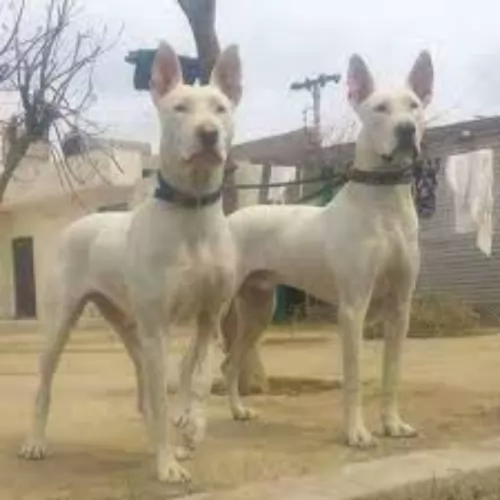 Easy to look after with his short coat, the Gull Terr will only require a brushing twice a week to keep the coat shiny and healthy.
Easy to look after with his short coat, the Gull Terr will only require a brushing twice a week to keep the coat shiny and healthy.
Because his coat is white, it can show dirt easily, and it will simply require taking a damp cloth and wiping the mark off him. You don't want to be bathing him often as this dries his skin out – rather just wipe the coat down.
Your Gull Terr is a highly energetic dog and he loves nothing more than to be involved in robust exercise and games. He is best suited in a home with large grounds and if you do opt to have him in the city, you will have to pay close attention to his exercise needs – lots of walks, runs, ball games, swimming and running with you as you cycle.
You want to be sure that your energetic Gull Terr has a healthy diet full of important proteins, fats, and carbohydrates.
Protein is always important for a dog like this and you want to make absolutely sure that apart from his high quality kibble, you mix in raw meat from time to time as well as cooked chicken, fish, brown rice and vegetables.
When looking for a commercially manufactured dog food, look for high-quality animal protein as a top ingredient. Make sure he always has fresh, cool water available to him.
1Feeding the puppy – don’t overfeed. Feed quality medium size breed 3-4 small meals per day
2.Feeding the adult – don’t overfeed. Feed quality medium size breed 1-2 small meals per day
running or hiking companion. long daily walks at a minimum. He loves to run and play with his family. Hunting and “coon trials” are his specialty and best ways to get exercise. He needs to run